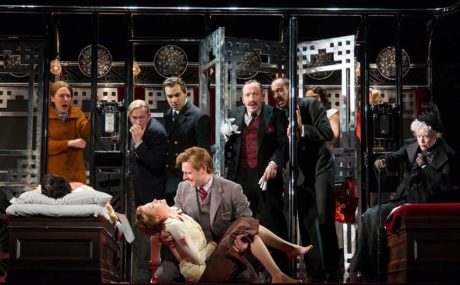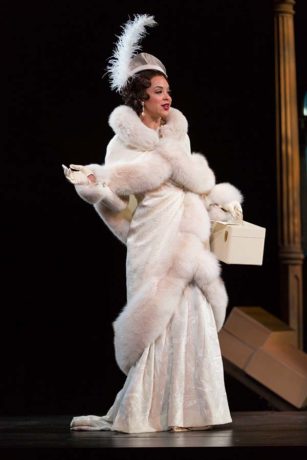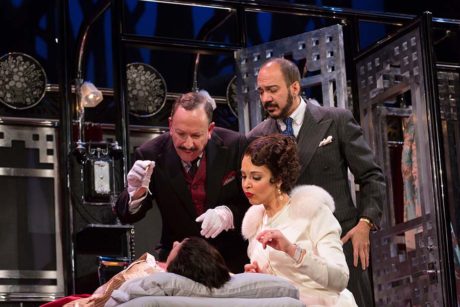One afternoon in 1979 or 1980, I saw Orson Welles on The Merv Griffin Show discussing his love of mystery stories. One of his favorites, he said, was Murder on the Orient Express. I was young, and I had not yet read the book or seen the movie version. Mr. Welles then proceeded to give away the mystery’s ending. I have not yet forgiven him.
So if you want to know who committed the murder in Agatha Christie’s Murder On the Orient Express, I won’t tell you. You’ll have to go to the McCarter Theatre and find out for yourself. But that’s OK, because you’ll have a terrific time watching this sparkling production.

Christie’s thriller has been adapted for the stage by Ken Ludwig, a playwright known for comic romps like Lend Me a Tenor. He even turned a Sherlock Holmes mystery into a farce in Baskerville on the McCarter stage a few years ago. Murder on the Orient Express has a quite different tone: the play opens with a disturbing scene of a child being abducted, a warning to the audience that this is, at its core, serious business. And while a lot of jokes (some quite corny) have been added to lighten the mood and reduce the tension, this is a mostly respectful take on a sometimes grim story. The play walks the tightrope between drama and comedy deftly: the plot (as in many of Christie’s stories) is mechanical at times, but the script takes delight in spoofing its ingenuity and its over-the-top improbability.
Set in 1934 aboard the legendary train traveling across Europe, the case finds Hercule Poirot, the celebrated Belgian (not French, as he keeps reminding people) detective, investigating the case of a man found stabbed to death in the bed of his private compartment. It turns out that the man was a vicious criminal, and Poirot finds there’s no shortage of people who had a reason to want the man dead. And a lot of them seem to be staying in the same cramped coach as the victim. With the train stranded by a snowstorm, will Poirot find the truth? As he might say, but of course.
Ludwig makes judicious cuts to the story to tell it in less than two hours: a number of the book’s lesser suspects have been eliminated, and interrogation scenes have been combined to make the story move quickly. But a few minor changes to the story are problematic. One is a newly added second crime occurring at a crucial moment; it’s unnecessary, and its solution is far too obvious. Also, in the novel, Poirot enlists a doctor from another section of the train to examine the body, providing vital information on everything from the nature of the stab wounds to the likely time of death. But Ludwig has eliminated this character, and instead enlists one of the suspects (not a doctor) to examine the body. Why the astute Poirot would depend on the analysis of someone eager to clear her own name is never explained. It’s an unnecessary plot hole, one that could be solved by having one of the cast members double as the doctor.

But chances are you’ll be too dazzled by what you see on the stage to worry about plot intricacies like that. Director Emily Mann has concocted a production that is cinematic in its scope, with lighting (by Ken Billington) and strategically placed curtains that focus the viewers’ eyes on key elements. The production values are startlingly high: Beowulf Boritt’s design for the train – gleaming silver surfaces with crimson accents – is a sleek marvel, and William Ivey Long’s lush costumes reach their apex (literally) with a series of comically exaggerated women’s hats.
Allan Corduner makes a fine Poirot, commanding the stage with low-key charm and dignity. Evan Zes is quite droll as his sidekick, a railroad official thrown into fits of anxiety by his concern that the murder might damage his company’s reputation. Julie Halston is outlandishly kooky as a talkative American passenger, and Veanne Cox is severe and arrogant as a Russian princess. (Cox, seen previously at McCarter as a saucy and spicy Olivia in Twelfth Night, is unrecognizable here as the elderly princess, her familiar face peeking out from under one of Paul Huntley’s impressive wigs.)
Alexandra Silber is well-suited to the role of an elegant Countess. She has a warm smile and an easy, casual rapport with Corduner. And Max von Essen is excellent as both a suave Scottish suspect and the crude American victim; Huntley’s wigs help with him pull off the multiple roles. (The accent work by all the actors is quite strong, thanks in part to the work of dialect coach Thom Jones.)

Ludwig’s succinct script and Mann’s shimmering, dynamic production have turned Christie’s sometimes dry story it into a highly enjoyable piece of theatre. It’s fun to follow, and it’s gorgeous to look at. Be sure to add it to your timetable!
Running Time: One hour and 50 minutes, with an intermission.
Agatha Christie’s Murder On the Orient Express plays through April 2, 2017, at the Matthews Theatre at McCarter Theatre Center – 91 University Place, in Princeton, New Jersey. For tickets, call the box office at (609) 258-2787, or purchase them online.




